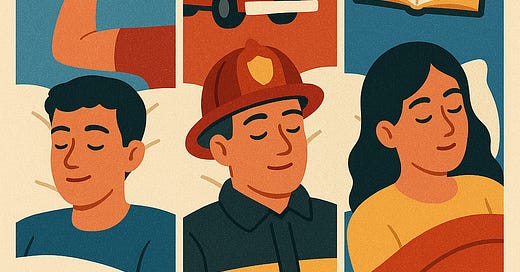Bro, Do You Even Rest?
Rest can transform your physical, professional, and intellectual training.
Rest Isn’t a Luxury — It’s Part of the Job
If you’re a firefighter or EMT, you already know what it means to push your limits. Whether you’re dragging hose lines, carrying patients, or cramming for your next certification, this job demands constant growth. But here’s something we don’t talk about enough: rest isn’t just a break - it’s part of your training.
“Rest is training” sounds like something you’d see on a motivational poster in a break room at the gym. But if you’re serious about staying physically, mentally, and professionally sharp, then how you rest is just as important as how you train. Let’s break down why, and how you can actually use rest to your advantage.
Rest and Physical Training: When the Sofa is Better than the Gym
Our jobs are physically demanding. When we work out, it’s not usually for fun - we’re training to save lives. But here’s the problem: if you’re always grinding, you’re actually holding yourself back. When you lift, run, or drill, you’re breaking your body down. It’s during rest that your muscles rebuild and get stronger. Skip that part, and you’re flirting with overtraining - nagging injuries, chronic fatigue, and that “why am I so slow today?” feeling.
I realized this when training for my first marathon. One afternoon when I was sprawled on the sofa, half sleeping and half watching a movie, my wife asked, “Aren’t you supposed to be training for a marathon?”
“I am,” I told her. “Right now. This is the training.”
We laughed, but it’s true. If you don’t give your body a chance to recover, it’ll force you to - and often at the worst possible time.
Research backs this up: a 2008 review in the Journal of Strength and Conditioning Research found that rest and recovery not only cuts your risk of injury but actually boosts your results. So, if you think skipping rest makes you tougher, ask yourself: are you training smart, or just being stubborn?
Rest and Skills Training: Don’t Let Practice Make Permanent (Mistakes)
Skill mastery requires repetition, but more isn’t always better. Ever notice how, after too many back-to-back drills, you start to get sloppy or your brain just checks out? That’s a cue that your body and mind need a break. Practice doesn’t make perfect; quality practice makes perfect.
Rest in skills training isn’t just about catching your breath, it’s about giving your brain time to lock in what you’ve learned. Sleep, lighter days, and even just stepping away for a bit can be the “apple a day that keeps burnout at bay.” A 2010 study in the Scandinavian Journal of Medicine & Science in Sports found that overtraining in high-stress jobs (like ours) can lead to irritability and mental fatigue - hardly what you want when lives are on the line.
So, next time you’re tempted to run “just one more” drill, ask yourself: is this making me better, or just more tired?
Rest and Learning: Your Brain Needs a Breather, Too
If you’re like me, you’re always learning - new protocols, certifications, the latest research. But here’s the thing: cramming nonstop doesn’t work. Your brain needs downtime to turn new info into real knowledge: a 1999 meta-analysis in the Journal of Applied Psychology found that spreading out your learning with breaks leads to better retention than marathon study sessions.
I just wrapped up my Advanced EMT certification after five months of study, clinicals, and exams. Right now, my brain is ready for a break, and I’m more than willing to give it one. That’s not slacking off - it’s smart. I’ve found that taking intentional “recharge time” helps me come back sharper and more motivated.
So, if you’re feeling guilty about taking a breather after a big test or course, don’t. You’re actually doing your brain (and your self) a favor.
How to Make Rest Work for You (Instead of Against You)
With unpredictable schedules like ours, rest doesn’t always come easy. But you can make it work with a little planning:
Physical Training: Schedule rest days. Seriously - real, actual rest days. After a tough shift, prioritize sleep and hydration over another workout. Use light activity (walking, stretching, an easy bike ride, foam rolling) on off days. Every 4-6 weeks, take a “deload” week to let your body catch up.
Skills Training: Mix up your drills. After a big training exercise (like a multi-hour disaster simulation), take a day or two to recover - mentally and physically. Watch for signs of overtraining: soreness that won’t quit, mental fog, or just feeling “off.”
Learning: Following a big push (like a new certification or promotional exam, or deeply intense study sessions), take a real break. Focus on family, hobbies, or just catching up on sleep. Trust that you’ll retain what matters, especially if you’re using those skills on the job.
And if your schedule blows up your rest plan? Adapt. Even a short nap, a quiet hour, or a quick walk can help. Remember: rest isn’t laziness - it’s tactical.
Challenge: Rethink What “Tough” Really Means
The mindset that we need to push through pain and exhaustion usually backfires. Especially in my training for endurance sports like triathlon and marathon, I’ve found that the real pros know when to hit pause. Every rest day rebuilds your body, every break after a drill sharpens your skills, and every pause from study cements your knowledge.
So, here’s my challenge: look at your week. Where can you build in a rest day, a lighter week, or a break from studying? Talk to your crew about it. Are you all grinding yourselves down, or are you training smart?
Let’s redefine toughness not as endless grind, but as the discipline to rest when it counts. When the next call comes, you’ll be ready - not just because you worked hard, but because you recovered smart.





